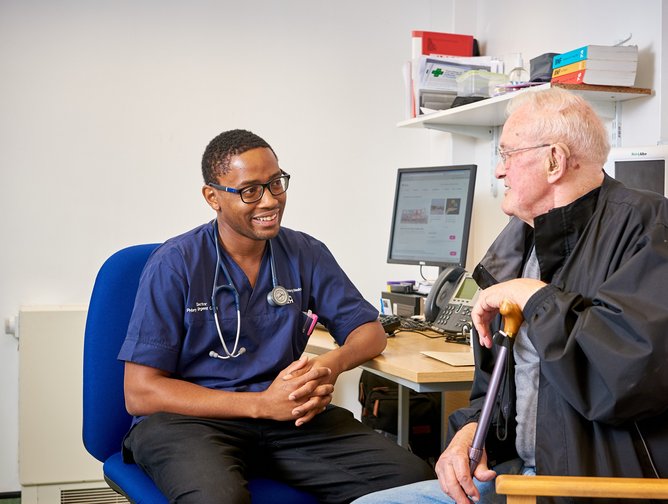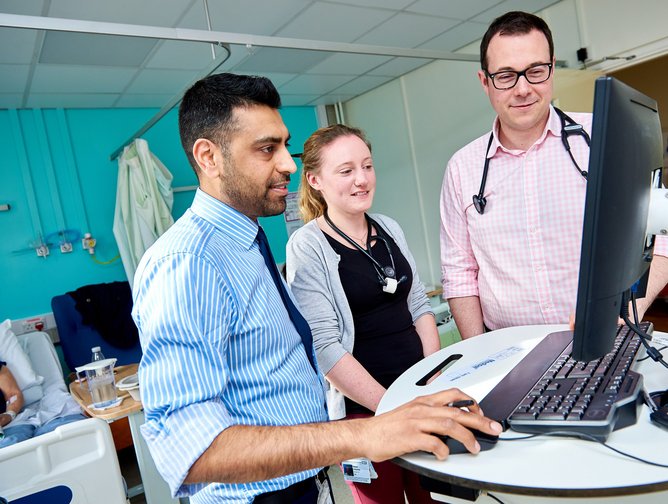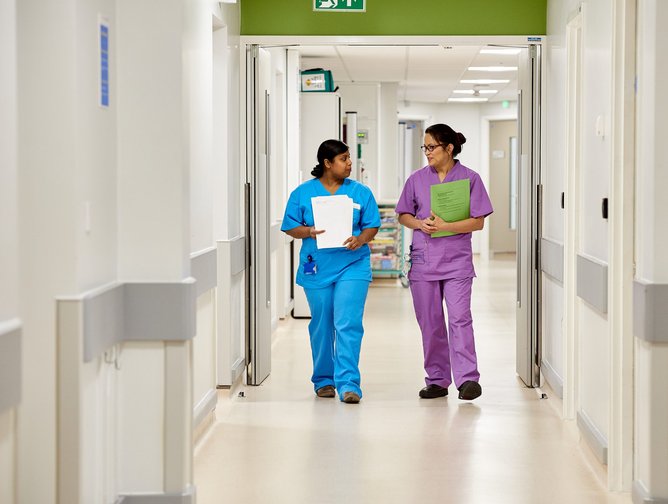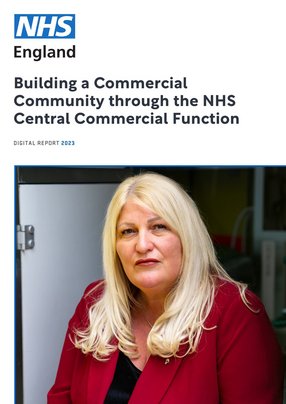“People often say that they fall into procurement. I didn't ‘fall’ into procurement; I made a very definite choice that this was the career path that I wanted to follow.”
These are the words of Jacqui Rock. Rock is NHS England’s Chief Commercial Officer and is spearheading one of the most significant reforms NHS procurement has seen since its inception. It’s a task of gargantuan proportions, but she has the expertise, the vision and the sheer tenacity to get it done through the NHS Central Commercial Function.
The Challenges and Opportunities
Rock points out that the private sector is very much profit-oriented, “especially in financial services, as you can imagine”.
“In the public sector though, we're extremely conscious of taxpayers’ money and of how we spend that money towards the provision of services.”
Beyond these key orientations, she notes that different sectors have different agendas, giving the example of the military (having worked in major programmes across the full military estate for the Army, Navy, Royal Air Force and Joint Forces Command), whose agenda is about protecting the realm.
With the NHS, the agenda is about providing the UK’s population with one of the best health services in the world, and Rock points out that these agendas come with their own particular challenges.
“Over the top of all of those sets of challenges, though, there are also those that we as commercial professionals constantly face – whether that be the challenge of supplier resilience, the supply chain and the availability of goods, the costs of inflation, or our supplier relationships.
“Every sector or industry has challenges that we, as commercial procurement professionals, need to know how to handle.
“The NHS is in a very challenging time right now. We’re in the midst of a difficult winter and COVID-19 is still with us. Then we have the significant impact of the cost-of-living crisis, higher inflation, increasing energy prices and the overall pressure that not only the NHS and our people are feeling, but also pressures that are being felt across the entire country.
The way that I'd like to summarise that is by pointing to Amanda Pritchard, our Chief Executive, who, at the NHS ConfedExpo in June 2022, laid out the priorities for the NHS under ‘the four Rs’.”
Recovery, Resilience, Reform and Respect
“First we have ‘Recovery’,” she says. “NHS staff are moving heaven and earth right now to deliver the Elective Recovery Plan, which is one of our biggest challenges. But this is also the most ambitious catch-up programmes in health service history.”
Where appropriate, and where patients are willing to be transferred, NHS England is implementing programmes to realise those transfers, enabling access to healthcare – not just between hospitals or trusts, but between regions – and is also strongly focused on spreading innovation in recovery and best practice across the entire country.
The second ‘R’ is ‘Reform’, and there are silver linings to dark clouds. “The pandemic supercharged the NHS with innovation,” says Rock. “We started using new drugs, new technologies and new ways of working to treat those with the virus, and to care for all of the millions that had numerous other conditions.”
The pandemic also emphasised the importance of collaboration between different NHS organisations in the service of patients. Rock emphasises this by noting that traditional barriers were really broken down.
The third ‘R’ stands for ‘Resilience’.
“At NHS England, we're now producing a Workforce Plan, which is going to look at people, skills and training – not just for what we need now, but for what we’ll need in the next five-to-ten years – and look out to the longer term.
“And then, finally, I'll touch on ‘Respect’. Healthcare is about experience, and it's about outcomes – which is why respect is absolutely vital.
“We respect our patients, which means making sure that they are informed and ensuring that they and their families are treated with dignity.
“And, of course, we respect the British taxpayer, which really, also from a commercial perspective, is critically important.
“We’re making sure that we’re spending public money really wisely, and, with all of these challenges, I constantly remind myself of the great public support for having a National Health Service.”
Rock is right. She refers to the recently published Ipsos MORI poll from April 2020, “which showed that 62% of the public feel that the NHS was the thing that made them the most proud to be British”.
NHS England: A Singular Vision
How could one not be proud of this role? Rock’s position is one of great responsibility, and, equally, one that’s a great point of pride – and should be.
Jacqui Rock took on her role as NHS England’s Chief Commercial Officer on 1st of January 2022, and she feels that one of the most gratifying things about working in the NHS has been the people.
This is fitting for a National Health Service whose ultimate goal concerns the wellbeing of people, and in fact, begins with people, is carried by people, and ends with people. A truly British and essentially democratic institution – and Rock is instinctively aware of this.
“Regardless of the pressures everybody is under, regardless of the challenges the NHS is facing, as I go around the hospitals, everybody is on mission. Everybody shares the same vision. Everybody wants to do the absolute best they can, even under the most difficult circumstances.
“And, for me, that's been absolutely gratifying. To work in an organisation that actually employs more than 1.2 million people, where everybody has the same drive and the same mission, is incredible.
Carter, Boardman and The Government Procurement Bill
Rock touches on The Carter Review that also took place in 2015, which concerned operational productivity in the NHS.
“It was a real key moment in the journey of NHS procurement,” she says. “The findings in the review changed the way we were recommended to work, and they informed our future ambitions.
Another significant event that occurred in this timeline was the Boardman review of government procurement in the wake of the COVID-19 pandemic, which was published in 2021.
Similar to the Carter Review, the Boardman Review looked at how the NHS works across spending taxpayers’ money and provided some significant recommendations for the future.
Some of its key findings concerned transforming supply chain resilience, integrated roles for commercial and procurement expertise within strategy formation, and, most importantly, procurement strategy as being central to policy making when the NHS are spending government money.
Rock says: “When it comes to procurement – and this also applies to the NHS – this is something I am dedicated to, and very much focused on enhancing and fixing. We have gathered and leveraged all of the lessons and reviews that have taken place to ensure that we deliver on the recommendations through the NHS Central Commercial Function.
“Going forward, in 2023, we've got the launch of the Procurement Bill, which is currently going through Parliament. The intention of the Bill will be to reform the UK's public procurement regime to streamline new procedures, and is intended to save time for public bodies and suppliers, allowing us to promote commercial outcomes and deliver more value for the money.
“The new Procurement Bill is fundamental to the NHS Central Commercial Function, which we’re rolling out so we can ensure that the NHS is ready and able to procure and leverage the market.”
The NHS Central Commercial Function
In July 2022, Jacqui Rock launched the next evolution of the commercial service offer for the NHS - the Central Commercial Function (CCF), which aims to build a world class commercial community in the NHS. This will help unlock significant commercial opportunities for the NHS including leveraging NHS buying power where appropriate, delivering value for money for the taxpayer, ensuring clinicians have the right products and services they need at the right time, and tackling some of our commercial challenges such as supplier resilience.”
“This wasn’t something that we at NHS England have done alone. After spending months visiting trusts and seeing all the amazing commercial activity that’s taking place across the NHS, we've engaged closely with commercial teams right across the NHS, and have ensured that their feedback was incorporated into the development of the NHS Central Commercial Function.
Our collective ambition is a modern, effective, and efficient procurement function in the NHS that is among the best in the world, one that truly delivers taxpayer value, supports innovation, stimulates growth, and most importantly, delivers the highest quality of patient care.’’
Since the launch, Rock and her team have developed a robust programme plan and have governance in place. They’ve really been focusing on putting NHS commercial and procurement teams at the forefront of change, and raising their profile with many of their suppliers.
The 7 service offerings of the NHS Central Commercial Function
The NHS Central Commercial Function is comprised of 7 service offerings, which are already delivering across the system.
- Commercial Best Practice – Enabling the NHS commercial community to access tools, expertise and cutting edge knowledge to deliver purchasing activities at every level of the NHS.
- Governance, Assurance & Processes – Endorsed, standardised and compliance-assured routes to market that wield NHS influence and promote innovation to deliver government priorities.
- Technology and Data – Developing and adopting technology that provides the NHS with insight into procurement value and savings opportunities and outcomes. This will help to leverage, rationalise and shape the market.
- Commercial Strategies – Creating a universal strategy across the NHS with clear commercial activities and routes to market that facilitates ease of doing business.
- Sustainability & Innovation – Developing an NHS-wide approach to delivering net zero and social value, driving innovation and eradicating modern slavery in the supply chain, enabling stakeholder engagement and application.
- Sourcing and Management – Developing a strategic partnership approach that leverages the NHS buying power, shapes the market, drives innovation and resilience in the NHS.
- People and Community – Embedding a unified community of procurement and commercial specialists who strive to deliver and uphold the NHS Commercial Strategy ensuring best value for money.
Using a universal e-commerce system
A key deliverable of the Central Commercial Function was introduced just weeks after its launch – and that was the universal rollout of the ecommerce system: Atamis.
NHS England made Atamis available to all health and family organisations, following funding from Crown Commercial Services and working in partnership with the Department of Health and Social Care in July 2022.
It is being used by a range of different organisations across the health family, namely (1) NHS Providers, (2) NHS Integrated Care Boards, (3) NHS CSUs, (4) national bodies (e.g. NHS England, UKHSA) and (5) the Department of Health and Social Care.
Rock says: “So far, 131 health family organisations have onboarded to the platform and nearly 29,000 suppliers have registered on the platform in order to respond to opportunities and manage their contracts with the NHS.”
“The key point of using a universal e-commerce system is that, by the end of the financial year we will have a really detailed view of commercial spend. We will know where we are spending, where the variance exists, and where we are getting better value for money.
“We will have a very good view of our supplier footprint across 220 trusts and thousands of primary care providers, so it's a really key initiative.
“We've got to be data-driven, because, ultimately, service provision is all about the data. Up to this point, it's been very hard to pull data together and actually have that overall NHS view – and this is going to enable us to do that.”
NHS organisations are already seeing the benefits. The London Ambulance Service (LAS) were one of the first to onboard. Operating across London out of 70 ambulance stations, LAS has an annual addressable non-pay expenditure of around £150mn and over 340 active contracts valuing over £296mn.
Using a universal e-commerce system has allowed them complete visibility of their pipeline of procurement activity which means that the team can be more proactive with resource planning and plan upcoming procurements in a transparent and consistent manner.
Shaping the Market: Eliminating Waste and Redundant Contracts
One of Jacqui Rock’s key commitments is to implement a strategic supplier management programme to help the NHS to shape and leverage the market.
Rock says: “We should be leveraging the market. We should be able to drive innovation through our suppliers. We must focus on greater resiliency in our supply chain. We want to focus on eliminating waste, and one of the things that I found really enlightening when I came in here, is that we’ve got multiple contracts with the same supplier for the same thing, but with lots of variation.
“This is something that we need to work on collaboratively and in partnership with our big strategic suppliers to discover how we can just simply buy better in the NHS.
“So we've been spending a lot of time listening to suppliers and our key stakeholder Strategic Supplier Relationship Management teams to understand how this presently works and how we can align our strategies to make it as easy as possible to supply to the NHS.”
NHS England's Sustainability Roadmap
In October 2020, the National Health Service published a report called the Greener NHS Report, which announced that the NHS will be net-zero by 2040 and, for its carbon footprint plus, by 2045.
Over 60% of the total NHS Carbon Footprint sits within its supply chain and these include emissions from freight, the manufacturing of goods, catering, business services and construction.
“Our net-zero procurement plans are aligned with government policy,” says Rock. “From April 23rd, the NHS will adopt the government’s ‘Taking Account of Carbon Reduction’ plans PPN, which will require all suppliers of contracts valued over £5mn to publish a carbon reduction plan for their direct missions.
“We have also adopted the government social value model, which ensures that a minimum of 10% waiting on net zero and social value, is included in all tenders; The NHS Central Commercial Function team have been producing detailed guidance to support trusts with this.
“It's a new area for many of the trusts and certainly many of our suppliers, so we've been ensuring we can deliver that support right the way through this process.”
The Mission: Collaboration, Communication and Partnership
The reason that Rock set up the NHS Central Commercial Function was to take a good hard look at how they buy across the NHS, so that taxpayer money is being spent in the most efficient way. Their commercial spend is in excess of £30bn per year. It's the largest spend in government, and they are spending in a very federated way because the NHS isn't just one organisation. The NHS is already one of the most efficient health services in the world, spending 2p in the pound on administration, compared to 5p in Germany and 6p in France, but Jacqui Rock says that there are opportunities to go further.
“We want to make sure that NHS bodies and trusts have the autonomy to run their hospitals and their clinical pathways.
“But the real value of the commercial team is in collaboration: it’s about bringing everybody across 4,000+ procurement and supply chain professionals together, so that we can agree on category strategies and move forward with a single vision.
“What I am really doing is getting people to work together as commercial professionals.
“It’s about collaboration, it's about community, it's about partnership.
“Our buyers are very gifted – they know what they're doing – but they will be supercharged in their effectiveness once brought out of their silos and enabled to see the bigger picture, for a better, stronger and much more effective NHS.”





